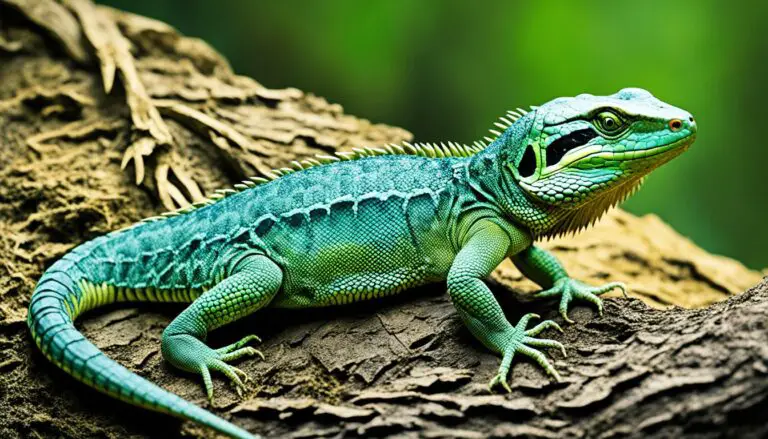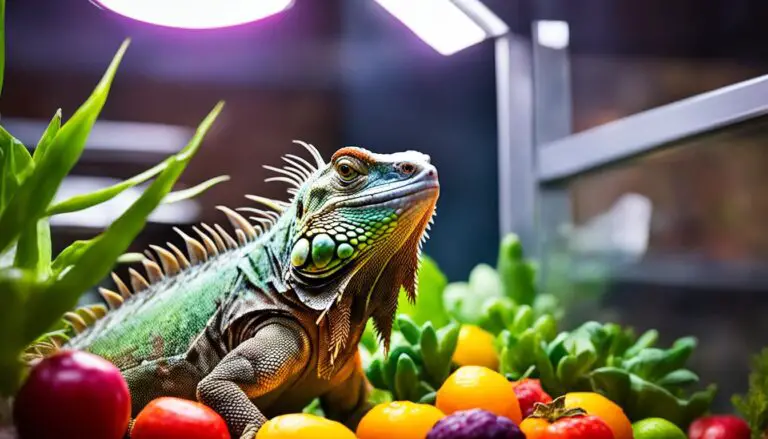Omega-3 for Exotic Pets: Health Benefits & Advice
Omega-3 fatty acids do wonders for exotic pets. These nutrients, like ALA, EPA, and DHA, are vital for health. They boost brain function, maintain a healthy coat, keep eyes sharp, and more.
Types of pets like birds, ferrets, and reptiles benefit greatly from omega-3. It supports various body functions, from their hearts to their joints. Healthy fats, such as omega-3, also help pets grow smart and keep their immune systems strong.
Some pet foods lack enough omega-3. Luckily, you can find supplements made for exotic pets. These ensure your pets get the right amount of these healthy fats.
This article will dive into the world of omega-3 for exotic pet health. We’ll look at where to find omega-3 and its benefits. Plus, we’ll share tips on using supplements. Keep reading to learn how omega-3 can make a big difference in your exotic pet’s life.
Key Takeaways:
- Omega-3 fatty acids offer numerous health benefits for exotic pets, including improved brain function, healthy skin and coat, enhanced eye health, better gut health, reproductive system support, heart health, and joint health.
- Exotic pets may not receive adequate omega-3 fatty acids from their regular diet, making it important to supplement their diet with omega-3 sources.
- Omega-3 supplements specifically formulated for exotic pets are available, providing a concentrated dose of essential fatty acids in a palatable form.
- Consult with a veterinarian to determine the appropriate dosage and quality of omega-3 supplements for your exotic pets.
- Different exotic pets can benefit from omega-3 supplementation in various ways, depending on their specific needs and characteristics.
The Importance of Omega-3 for Exotic Pet Health
Omega-3 fatty acids are vital for the health of exotic pets. They are key for many body functions. These benefits help keep exotic pets healthy.
Omega-3s boost brain function. They’re good for thinking and memory. Your exotic pet’s brain will work better with them.
They also help skin and coat health. Omega-3s lessen skin irritation. They keep the coat glossy. This is really good for pets with delicate skin or skin problems.
“Omega-3 fatty acids are essential for maintaining the overall health of exotic pets.”
Omega-3s aren’t just good for the skin and brain. They also help the eyes. These acids keep the eyes working well. They ward off eye problems that come with age.
They’re great for the gut too. Omega-3s support a healthy stomach. They lower the chance of stomach problems.
Omega-3s are also good for the reproductive system. They help pets have babies. These fatty acids balance hormones and keep the system healthy.
They’re important for the heart as well. Omega-3s keep the heart strong. They help avoid heart issues.
Omega-3s are good for the joints too. They cut down on joint pain. Pets move and feel better because of them.
But, pet foods today often don’t have enough omega-3s. This is why you might need to add supplements. Exotic pet-specific omega-3 supplements can help a lot.

Adding omega-3s to your pet’s diet ensures they eat well. Your vet can help with the right amounts. This keeps your exotic pet healthy.
| Benefits of Omega-3 for Exotic Pets |
|---|
| Improved brain function |
| Healthy skin and coat |
| Enhanced eye health |
| Better gut health |
| Reproductive system support |
| Heart health |
| Joint health |
Omega-3 Sources for Exotic Pets
It’s vital to keep exotic pets healthy with a good diet. They need omega-3 fatty acids, and there are many places to get them from.
Plant-Based Sources
You can find ALA, a plant-based omega-3, in everyday foods:
- Flax seeds: Plenty of ALA. Grind them up and mix them with your pet’s meals.
- Soy: Tofu or tempeh is good for omega-3 too.
- Perilla and canola oils: They’re great toppings for your pet’s food, full of ALA.
- Walnuts: Eating a few will add ALA to your pet’s diet.
Animal-Based Sources
Fish oil is a great source of EPA and DHA, omega-3s from animals:
- Fish oil: Supplements for pets have EPA and DHA. Always pick a top-grade product to avoid toxins.
For a balanced diet, exotic pets need both plant and animal omega-3 sources. Mixing different sources gives them all the vital nutrients for health and happiness.

| Plant-Based Omega-3 Sources | Animal-Based Omega-3 Sources |
|---|---|
| Flax seeds | Fish oil |
| Soy | |
| Perilla and canola oils | |
| Walnuts |
Omega-3 Supplements for Exotic Animals
Specific omega-3 supplements for exotic animals are on the market. Look for products like Omega-3 Booster™. They come packed with omega-3 fatty acids in a form animals love. Thus, they’re easy to give to parrots, ferrets, or turtles, and can improve their health.
| Exotic Animal | Omega-3 Supplement Dosage |
|---|---|
| Birds | 1-2 drops per day mixed with food or water. |
| Mammals (Ferrets, Rabbits, Rodents) | 1-2 drops per day mixed with food or administered directly. |
| Reptiles | Consult a veterinarian for the appropriate dosage based on the specific species. |
It’s crucial to get the right dosage for exotic pets by talking to a vet. A veterinarian customizes suggestions for each pet’s needs. They ensure your pet gets exactly what it needs without guesswork.

Adding omega-3 supplements to an exotic animal’s food can fix dietary gaps. Following the correct usage, these supplements are a reliable way to meet your pet’s omega-3 needs.
These supplements boost your pet’s brain, joints, and fur. Make sure to pick top-notch supplements and stick to the dosage advice. This way, your pets gain the most from omega-3.
Benefits of Omega-3 for Different Exotic Pets
Omega-3 fatty acids have many benefits for exotic pets. They are crucial for their health and well-being. Let’s see how omega-3s help various exotic pets.
Birds
Omega-3 is great for birds’ health and feathers. It makes their skin and feathers glossy. This prevents dry, brittle feathers. Omega-3 also boosts birds’ immune systems, keeping them healthy.
Mammals like Ferrets, Rabbits, and Rodents
For small mammals like ferrets, rabbits, and rodents, omega-3 is essential. It helps their heart and joints stay healthy. Omega-3s lower inflammation, which is good for pets with joint problems or the elderly.
Reptiles
Reptiles also benefit from omega-3. It keeps their skin healthy and helps them avoid shedding issues. Omega-3s are key for their overall vitality and wellness.
The benefits of omega-3s depend on the pet’s species and its needs. It’s wise to talk to a vet to find the best supplements and doses for your pet. This ensures your pet gets the right care.

Offering an omega-3-rich diet to exotic pets enhances their lives. This includes animals with feathers, fur, and scales. Omega-3s are a natural way to address their needs. From shiny feathers to supple joints, omega-3s support your pets. They help your exotic animals thrive and be their healthiest.
Omega-3 Fish Oil for Exotic Pets
Omega-3 fish oil is highly sought after for pets, including exotic animals. It is rich in essential fatty acids that boost the animals’ health. Choosing a top-notch omega-3 fish oil is important. Make sure it’s clean of heavy metals and harmful chemicals for the best nutritional value.
Omega-3 fish oil is packed with EPA and DHA, crucial for pets’ health and bodily functions.
This supplement does wonders for pets. It improves their skin and coat, keeps their heart healthy, and helps their joints move smoothly. It also strengthens the immune system and fights inflammation. These benefits support exotic pets’ well-being and could help those with ongoing conditions.
Choosing a High-Quality Omega-3 Fish Oil Supplement
When picking the right omega-3 fish oil, consider a few things:
- Purity and Contaminant Testing: Go for supplements that are thoroughly checked for pollutants. This step ensures your pet’s safety and health.
- Source of Fish Oil: Always know where the fish oil comes from. Fish like anchovies and sardines are great sources of omega-3. They offer top-quality fatty acids.
- Additives and Fillers: Keep away from supplements that use artificial stuff. Choose those with simple, pure ingredients for your pet.
Speaking with a vet before adding any new supplement is wise. They will give advice tailored to your pet’s needs and health.
| Benefits of Omega-3 Fish Oil for Exotic Pets |
|---|
| Promotes healthy skin and coat |
| Supports cardiovascular health |
| Aids in joint function |
| Enhances the immune system |
| Reduces inflammation |
Considerations When Using Omega-3 Supplements for Exotic Pets
Using omega-3 supplements for your exotic pets’ health can bring many good things. But, there are key points to remember for your pets’ safety.
Firstly, talk to a vet before you give your pets omega-3 supplements. This step is very important. A vet will know what your pets need and how much supplement is right for them.
Choosing the best omega-3 supplements is also key. Only pick from trusted brands. They should follow strict rules and make high-quality items. This way, you know the products are safe and good for your pets.
Omega-3 supplements are great, but not for every pet. If your exotic pet has stomach issues or tends to bleed easily, omega-3 might not be for them. Always check with your vet before starting any supplement.
Thinking about these tips and talking to a vet can help. You’ll be able to give omega-3 to your exotic pets the right way. This will boost their health and happiness.
Benefits of Omega-3 Supplements for Exotic Pets:
- Promotes healthy brain function
- Supports skin and coat health
- Enhances eye health
- Improves gut health
- Supports reproductive system function
- Promotes heart health
- Supports joint health
The Role of Omega-3 in Exotic Pet Care
Omega-3 fatty acids are crucial for exotic pets. They help keep pets healthy and support their bodies. These nutrients prevent serious diseases and keep your pet fit.
They provide a lot of health perks for pets. Omega-3s lessen inflammation and boost the immune system. This cuts down on sickness, keeping your pet strong.
Heart health is a main advantage of omega-3s for exotic pets. Adding omega-3s to their food helps their heart work well. This lowers the chance of heart issues.
Enhanced Cognitive Function
Omega-3s are great for brain health in exotic pets. They aid brain growth, memory, and thinking power. Feeding your pet omega-3s keeps them mentally sharp.
“Omega-3 fatty acids are key to keeping exotic pets healthy. They support many body functions and must not be ignored.”
They also make skin and fur look good. These nutrients soothe skin, fight dryness, and make the coat shiny. Giving enough omega-3s keeps your pet looking healthy.
Omega-3s are important for joint health too. Just like domestic pets, exotic ones can have joint issues. Omega-3s cut down swelling, ease joint pain, and aid movement. This helps your pet be happy and active.
The Importance of Balance
Getting the right balance of omega-3s is vital. Always talk to a vet to choose the best amount for your pet.
Pick quality omega-3 products that are clean and strong. This ensures your pet gets the best health benefits.
| Pet Type | Benefits of Omega-3 |
|---|---|
| Birds | Improved overall health and feather condition |
| Ferrets, Rabbits, and Rodents | Supports cardiovascular health and joint function |
| Reptiles | Promotes healthy skin and overall vitality |
Adding omega-3s to your exotic pet’s diet makes a big difference. Doing so ensures your pet gets all they need. This is key for a healthy and balanced diet.
Remember, always ask your veterinarian about using omega-3 for your exotic pet. They can recommend the best supplements for your pet’s health and joy.
Conclusion
Omega-3 fatty acids are crucial for exotic pets’ health and happiness. They help improve brain function and keep the skin and coat healthy. These nutrients also support eye, gut, and reproductive health. Adding omega-3 supplements to a pet’s diet is a smart move. It can help pet owners ensure their pets live long and well.
But, talking to a vet before adding these supplements is important. Vets can figure out the right amount for each pet and check the supplement’s quality. This teamwork with a vet is the best way to give pets proper nutrition.
Eating right is very important for exotic pets. Omega-3s, combined with a good diet, are key. If you care about your pet’s health, think about using omega-3 supplements. They can help your exotic pet lead a happy and healthy life.
FAQ
What are the health benefits of omega-3 for exotic pets?
Why is omega-3 important for exotic pet health?
Where can omega-3 fatty acids be found for exotic pets?
Are there supplements available for exotic animals to get omega-3?
What are the benefits of omega-3 for different exotic pets?
Can omega-3 fish oil be given to exotic pets?
Are there any considerations when using omega-3 supplements for exotic pets?
What is the role of omega-3 in exotic pet care?
How can omega-3 benefit exotic pet health?
Source Links
- https://avianexoticsvet.com/blog/omega-3-fatty-acids-for-everyone-feathered-furred-or-scaly/
- https://vetnutrition.tufts.edu/2018/06/should-i-give-fish-oil-to-my-pet/
- https://blog.adoredbeast.com/omega-3-for-dogs-and-cats-whats-the-best-source/
Peter Stones is the founder of Exotic Pets Place, the leading online resource for exotic pet care information.
With over 10 years of hands-on exotic pet ownership experience, he is deeply passionate about sharing his expertise to help others properly care for their unusual pets.
When he's not writing extensively researched articles or connecting with fellow exotic pet enthusiasts worldwide, you can find Peter at home tending to his own beloved menagerie of exotic animals.







